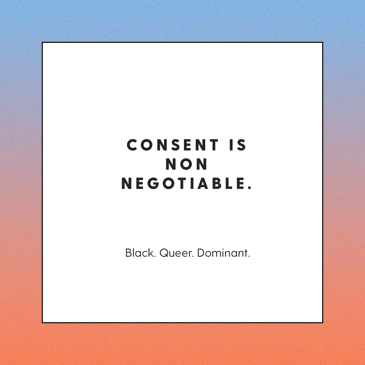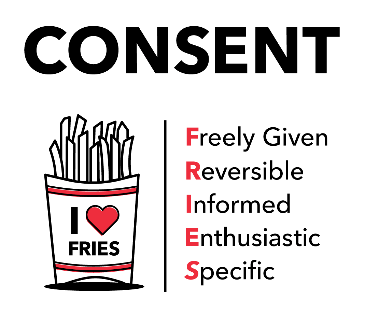I once gave someone a hug without consent. I didn't realize it at the time. And that's the really challenging thing about consent. It's not always universal and getting consent is often nuanced. What someone feels in this moment could change. And it's YOUR RESPONSIBILITY to create the space to check in and always ensure you have consent.
I made lots of assumptions that led to my crossing this person's boundary. I was unfamiliar with the term Enthusiastic Consent and didn't operate with the framework I do now. I hugged another Masculine of Center person at work. We had hugged many times before (assumption that because we've done it before it's always something that will happen) and we had a culture of hugging one another as a social justice based organization (assumption that because it was a cultural framework of the organization it was almost expected). When this person told me that day they were sick and didn't want a hug, I also assumed that was because they didn't want to get me sick. It didn't occur to me that they were setting a boundary and when I hugged them, to prove I wasn't worried about getting sick, that I wasn't listening to their words, desires and energy. I learned from that moment and have committed to educating myself so that I don't ever find myself in that position again.
We live in a culture that doesn't listen to people when they have the courage to stand up and say their boundaries have been crossed. Often in popular culture, coercion is viewed as romantic. Consent is often assumed as being granted from a lack of an outright and forceful “no” or physical pushing away, and the ignoring of such actions is in many books and cinema viewed as romantic because the woman just didn’t know what she really wanted. It has created a VERY BIG PROBLEM in our culture: that consent is implicit, silence implies consent to continue. Even as a survivor of rape, a comprehensive understanding of consent did not come naturally to me. Because it requires retraining our minds and hearts to show up in ways that align with our values. We must cultivate safe spaces for Enthusiastic Consent, Radical Honesty and Transparency. This is important across our lives, but in BDSM it is essential.
The mantra in the BDSM community is "safe, sane, consensual." These tenants are how the BDSM community delineates ethical play from sexual practices that would to be condemned as reckless or coercive.
I believe the framework of "sane" is ableist and creating more spaces for Black queer/trans disabled bodies in kink is important, for all of us. Shout out to the Black Youth Project for this dope article on the power of Black queer disabled kink.
So my focus as Dom is on safety and enthusiastic consent instead. I also believe in being sober (I don't play under any altered state) as it has the potential to compromise safety. For the person submitting, enthusiastic consent can't be given if they are in an altered state of mind (because of substances, stress or anxiety) where they can't take care of themselves.
Questions you should be asking: Is everyone grown? (i.e. an adult, over 18), giving enthusiastic consent throughout all aspects of what's happening? Is it (relatively) safe for everyone involved? Getting to yes on all of these is the starting place for ethical BDSM play.
The Submissive Guide offers a great definition for safety in A Submissive Approach to Safe, Sane and Consensual
Safety as far as relationships go would be protecting what you feel to be valuable. This would be your limits, your needs and wants and any other substantial belief systems you already have in place, such as religion or family ties. You also want to protect your physical and emotional safety. During negotiations for a relationship, or just getting to know one another, figure out how your partner plans to take care of you and if they will allow you some leeway in how you can care for yourself if needed. Even slaves have a responsibility to make sure that their emotional and physical well-being is taken care of.

What is Enthusiastic Consent?
Consent is about saying “yes” and respecting and accepting a person’s right to say “no”.
Enthusiastic consent ensures that everyone involved in intimate or sexual acts are enthusiastically consenting to everything that happens. This means everyone participates because they are excited, not because anyone feels pressured into it. You should seek a verbal yes and receive it. Safe words allow you to play safely where someone might want to say no as part of a scene but they do not actually intend for you to stop. Establishing a safe word, soft and hard boundaries in advance of any play is essential to maintain a consensual and safe environment for BDSM.
Consent plays a huge role in any BDSM scene, whether between two romantic partners or a Dom/Dominatrix and a client. Not only do clients and professionals consent to the specifics of any session before it begins through dialogue (and often through paperwork/contracts in professional scenes), BDSM sessions (or scenes as we often refer to them) require constant communication and the reestablishing of boundaries and safety. I don't use BDSM contracts but if you want to, this is a great article. Experienced BDSM practitioners use safe words, check-ins, and reading of facial expressions, and body language to ensure that those we play with are safe and comfortable for the duration of any scene.
It's also really important to ensure that in creating spaces of sex positivity that we don't shame others or create pressure to participate in acts they might not actually feel 100% comfortable with.
"Sex positivity is generally defined as an attitude that regards all consensual sexual activities as fundamentally healthy and pleasurable, but that is not necessarily how it is always applied. The concept of sex positivity has also, unfortunately, emboldened a lot of people to play out their unethical sex practices by misusing it to coerce others into the kind of sexual play that they want, regardless of what the other party wants or needs."
-Sherronda J. Brown, BYP
You can use the acronym F.R.I.E.S. to remember the components of gaining consent in a grounded and ethical way that honors not only those who submit to you, but those across your life. Consent should be:
Freely Given: Consent should be given without pressure, force, or under the influence of alcohol or drugs.
Reversible: You can change your mind about what you want to do at any time -- even if you are in the middle or have done it before – like sex.
Informed: You should know exactly what you are giving consent to. For example, if someone says they are going to use a condom and they don’t, they didn’t have your consent.
Enthusiastic: Someone should be excited to give consent. If someone is not sure, it is always better to wait.
Specific: Saying yes to one thing does not mean you have said yes to other things. Consent should be given at every step.
